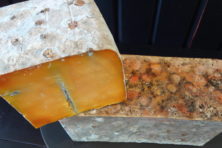The Cheese Insider
- Share
- Tweet
- Pin
- Share
In the last article of The Cheese Insider, “How Wisconsin Became the Dairy State,” I wrote about the “wheat crisis” in Wisconsin during the late 1870s and how the state agriculture business shifted from a cash crop industry to dairy.
By 1875 there were cheese plants being built throughout Wisconsin, especially in the central and southern parts of the state. Because the milk had to be hauled in milk cans and transported by horse and buggy, the cheese plants were built on nearly every four-corner intersection of the countryside. All the milk that was being supplied to these new plants came from a farm a mile or two away. There were forty-five cheese factories in Sheboygan County in 1875, producing over two million pounds of cheese annually. By 1900 the number of cheese plants in this county alone grew to nearly one hundred and they produced eight million pounds of cheese. Plymouth, located in central Sheboygan County, became known as the cheese factory capital of the world. By 1922 the number of cheese factories in the state grew to over twenty-eight hundred. The southern part of Wisconsin, especially Green County, soon became the epicenter of cheese during this period.
By the late 1890s as the number of cheese plants grew throughout the state, the cheesemakers, as well as the dairy farmers were helped by the College of Agriculture at the University of Wisconsin – Madison which offered courses in cheese making and provided technical assistance to the industry. The access to higher levels of education in the dairy industry gave inexperienced dairymen and cheesemakers the knowledge to continue the rapid growth of this “new” industry. The first significant breakthrough came in 1890 when Professor Stephen Babcock of UW – Madison developed a test to determine the butterfat content in milk. This discovery was a huge boon to the dairymen because now they had a uniform test to determine which cows were producing the richest quality of milk. The more butterfat, the more cheese and butter, thus better profits. This test revolutionized the life of a dairyman because now he became more of a businessman than ever before. Before the Babcock test farmers were paid the same for milk no matter how rich it may have been in butterfat. It paid for the dairyman to know which cows produced the best milk, and to continue looking for ways to improve the quality of the milk. The same test is used today not only in Wisconsin, but throughout the world.
Babcock Hall, on the campus in Madison, houses the Food Sciences Department of the College of Agriculture, as well as the Center for Dairy Research. This building is where any aspiring cheesemaker and other students in dairy sciences come to learn the art of making cheese, butter, yogurt, and ice cream. Short courses are still being offered at the University for people interested in the dairy industry, and are required for those seeking a cheesemaker license. Wisconsin is the only state in America to require all of its cheese and butter makers to obtain a license.
Babcock Hall is still a fixture on the campus in Madison. Current plans for enlarging and updating the facility are underway. As the world of dairy science grows they have outgrown this iconic building. Students, industry leaders, and cheesemakers come from around the world seeking technical help from the faculty and staff at this facility. Many of the great artisan cheeses that are on the market today were created with the assistance from this talented group of people.
There isn’t a student who has gone, or is going to school there today, that isn’t familiar with this famous building. The same can be said for many of the residents of Madison and southern Wisconsin. I was born and raised in Madison and became very familiar with Babcock Hall as a very young boy. My dad used to take our whole family there to get some of the best ice cream in the world. They still serve and sell ice cream, butter, cheese and yogurt from this facility all produced by the students, faculty, and staff. If you have never visited Babcock Hall be sure to do so next time you are in Madison.
Michael C. Thomas is co-owner of Schoolhouse Artisan Cheese with his wife Janice. With locations in Ellison Bay and Egg Harbor, they aim to bring the best of Wisconsin artisan cheeses to Door County, and with “The Cheese Insider” Michael hopes to bring all things cheese to readers of the Pulse.



